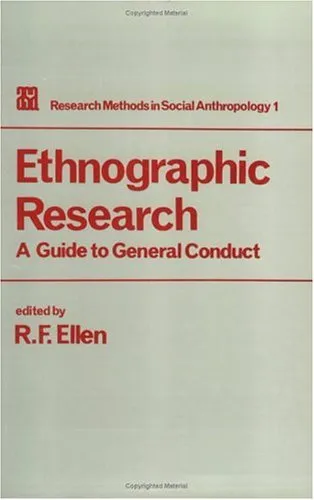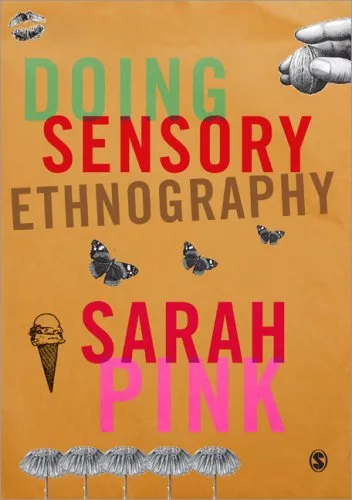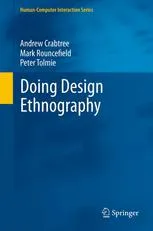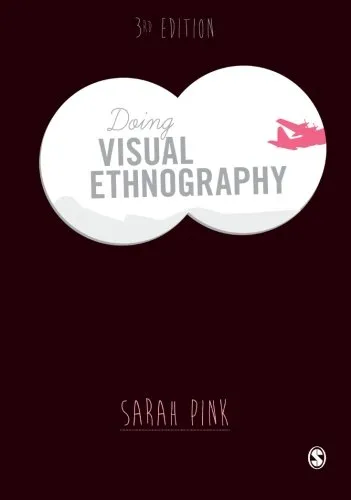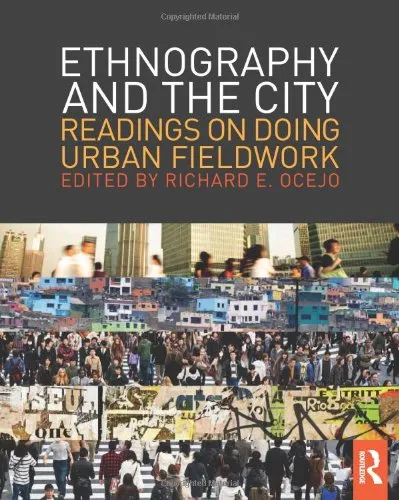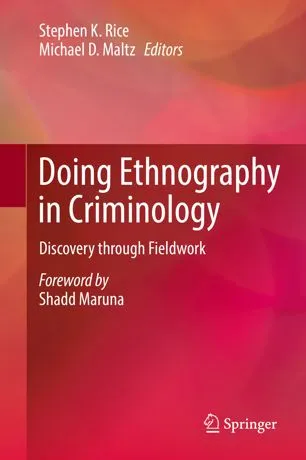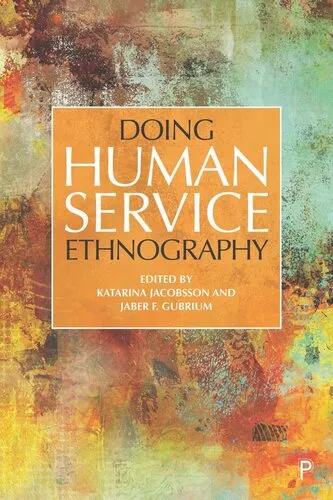Organisational Anthropology: Doing Ethnography in and among Complex Organisations
4.5
بر اساس نظر کاربران

شما میتونید سوالاتتون در باره کتاب رو از هوش مصنوعیش بعد از ورود بپرسید
هر دانلود یا پرسش از هوش مصنوعی 2 امتیاز لازم دارد، برای بدست آوردن امتیاز رایگان، به صفحه ی راهنمای امتیازات سر بزنید و یک سری کار ارزشمند انجام بدینکتاب های مرتبط:
معرفی کتاب: Organisational Anthropology - Doing Ethnography in and among Complex Organisations
کتاب Organisational Anthropology: Doing Ethnography in and among Complex Organisations اثری برجسته است که توسط ما، کریستینا گارستن و آنته نیکویست، نوشته شده و به بررسی عمق روابط انسانی، شبکههای پیچیده قدرت، و تأثیر فرهنگها در سازمانها میپردازد. این کتاب یک راهنمای عملی و علمی برای بهکارگیری روشهای Ethnography در تحلیل سازمانهای پیچیده امروز است.
خلاصهای از کتاب
این کتاب با تمرکز بر Anthropology سازمانی، نشان میدهد که چگونه میتوان با استفاده از روش Ethnography، به مطالعه تعاملات اجتماعی، ساختار مدیریتی و فرآیندهای تصمیمگیری در سازمانهای مدرن پرداخت. ما در این اثر، به بررسی سازمانها بهعنوان پدیدههایی چندلایه و پیچیده میپردازیم و تلاش داریم دیدگاههای عمیق و کاربردی در مورد چگونگی عملکرد آنها ارائه دهیم.
این اثر از سه بخش کلی تشکیل شده است:
- بخش اول: مقدمهای بر Anthropology سازمانی و اهمیت آن در دنیای امروز.
- بخش دوم: روشهای Ethnography و نحوه استفاده از آنها در محیطهای کاری گوناگون.
- بخش سوم: مطالعه موردی سازمانهای واقعی و تحلیل نحوه عملکرد آنها.
علاوه بر تحلیل مسائل مدیریتی و اجرایی، این کتاب توجه ویژهای به پیچیدگیهای فرهنگی، روابط غیررسمی و تأثیرات جهانیشدن در سازمانها دارد.
نکات کلیدی
این کتاب با روششناسی ویژه خود، چندین نکته برجسته را پوشش میدهد که برای پژوهشگران و فعالان حوزه مدیریت و Anthropology بسیار ارزشمند هستند. برخی از نکات کلیدی عبارتاند از:
- اهمیت تحلیل روابط میانفردی در سطح سازمانی.
- نحوه بررسی همزمان ساختار رسمی و غیررسمی در سازمانها.
- کاربرد Ethnography در شناسایی چالشها و فرصتهای نهفته در سازمانها.
- ارائه تکنیکهای عملی برای پژوهش در محیط کار.
- تحلیل پدیدههای اجتماعی از جمله مقاومت سازمانی، تطبیق با تغییرات فرهنگی و تأثیر ساختارهای قدرت.
این نکات به پژوهشگران این امکان را میدهد تا مسائل سازمانی را به شکلی عمیقتر و دقیقتر شناسایی و تحلیل کنند.
نقلقولهای معروف از کتاب
کتاب ما حاوی بسیاری از نقلقولهای معنادار است که به درک بهتر دنیای سازمانی کمک میکند. در زیر به چند نمونه اشاره شده است:
“To truly understand an organisation, one must delve into its everyday practices, its culture, and its hidden microcosms.”
“Anthropology fosters a unique lens through which organisations can be perceived not just as structures but as living, breathing entities.”
“In the complexity of organisational life lies the key to its understanding; the simplest tools are often the most profound.”
چرا این کتاب اهمیت دارد
کتاب Organisational Anthropology در دنیای پیچیده و همیشه در حال تغییر سازمانها اهمیت ویژهای دارد. این اثر به دلیل ارائه روششناسی منحصربهفرد و تحلیلهای چندبعدی خود، به یکی از منابع اصلی پژوهش در این حوزه تبدیل شده است.
این کتاب برای طیف گستردهای از مخاطبان شامل پژوهشگران، مدیران، و دانشجویان مدیریت و Anthropology نگاشته شده است. از طریق بررسی عمیق سازمانها بهعنوان سیستمهای اجتماعی پیچیده، این کتاب به فهم بهتر تعاملات انسانی و ایجاد تغییرات معنادار و مثبت در محیط کاری کمک میکند.
بهعلاوه، مباحثی چون بررسی اثرات جهانیشدن، تغییرات فرهنگی، و چالشهای مدیریتی باعث شدهاند تا این اثر در مطالعات اجتماعی-سازمانی متمایز و پرکاربرد باشد.
Introduction to "Organisational Anthropology: Doing Ethnography in and among Complex Organisations"
In today’s interconnected and intricate global systems, understanding the inner workings of organisations has never been more critical. "Organisational Anthropology: Doing Ethnography in and among Complex Organisations," authored by Christina Garsten and Anette Nyqvist, is a pioneering guide that delves into the intricate interplay between culture, structure, and power within organisations. This book is a cornerstone for scholars, professionals, and students interested in exploring ethnography as a method to study complex organisational dynamics. With its rich analysis, practical insights, and critical reflections, it opens up new avenues for appreciating and navigating the complexities of organisational life.
Grounded in anthropological theory and methodology, this book provides readers with essential tools to observe and interpret organisations as living, breathing social entities. Whether it is multinational corporations, NGOs, or governmental institutions, the text illustrates how ethnography can uncover hidden dimensions of organisational culture, politics, and identity. By bridging the gap between theory and application, it serves as a vital resource for both academics and practitioners eager to understand the cultural scaffolding of contemporary organisations.
Detailed Summary of the Book
The book is systematically divided, offering an in-depth discussion on the theoretical foundations of organisational anthropology while emphasizing practical, hands-on approaches to ethnographic fieldwork. Early chapters introduce readers to the core concepts of organisational anthropology, highlighting its strong emphasis on studying culture, structure, and systems of meaning. By examining anthropological theory, the authors equip readers with a framework to critically assess organisations as complex socio-cultural entities.
The middle sections navigate the methodological challenges and opportunities of conducting ethnographic research in complex settings. The authors reflect on processes of gaining access to organisations, establishing rapport with participants, and handling logistical and ethical considerations. Through vivid case studies and real-world examples, they illustrate how these challenges can become opportunities to enrich research results and build meaningful insights.
Finally, the text concludes with reflections on the role and responsibility of the organisational ethnographer. Discussions on how findings can be applied or translated into actionable insights for organisations underline the practical significance of the discipline. The book balances theory and practice to highlight the dual purposes of ethnography: understanding organisations and improving them.
Key Takeaways
- Ethnography is a powerful tool to uncover the hidden dynamics and cultural logics within organisations.
- Organisational anthropology allows researchers to view companies, NGOs, and institutions as living organisms with distinct cultural traits.
- The book emphasizes the importance of embedding oneself in the organisation to gain nuanced, firsthand insights.
- Practical tips on navigating ethical considerations, gaining access, and managing organisational complexities are extensively covered.
- Organisational anthropology not only advances academic knowledge but also informs meaningful changes within organisations.
Famous Quotes from the Book
“To understand an organisation is to immerse oneself in the web of meanings that its members weave together every day.”
“Ethnography in organisations is a practice of seeing the unseen and making sense of the rituals and routines that shape organisational life.”
“Organisational anthropology transcends the mere observation of systems; it is about engaging with the pulse of organisational existence.”
Why This Book Matters
In an era defined by rapid globalisation and unprecedented change, organisations have become loci of meaning-making, cultural exchange, and power dynamics. "Organisational Anthropology" emerges as a crucial text at the intersection of anthropology and organisational studies, offering fresh perspectives on how internal and external forces shape organisational life. By combining theoretical depth with practical advice, this book prepares readers to apply ethnographic methods to real-world organisational challenges.
This book is particularly relevant for anthropologists, sociologists, ethnographers, and business consultants looking to expand their methodological repertoire. It also serves as a critical resource for business leaders and managers who wish to better understand the cultural forces that define their organisations. As organisations become increasingly complex, understanding them through the lens of ethnography becomes an indispensable skill for shaping future innovation, governance, and global collaboration.
دانلود رایگان مستقیم
شما میتونید سوالاتتون در باره کتاب رو از هوش مصنوعیش بعد از ورود بپرسید
دسترسی به کتابها از طریق پلتفرمهای قانونی و کتابخانههای عمومی نه تنها از حقوق نویسندگان و ناشران حمایت میکند، بلکه به پایداری فرهنگ کتابخوانی نیز کمک میرساند. پیش از دانلود، لحظهای به بررسی این گزینهها فکر کنید.
این کتاب رو در پلتفرم های دیگه ببینید
WorldCat به شما کمک میکنه تا کتاب ها رو در کتابخانه های سراسر دنیا پیدا کنید
امتیازها، نظرات تخصصی و صحبت ها درباره کتاب را در Goodreads ببینید
کتابهای کمیاب یا دست دوم را در AbeBooks پیدا کنید و بخرید
1268
بازدید4.5
امتیاز0
نظر98%
رضایتنظرات:
4.5
بر اساس 0 نظر کاربران
Questions & Answers
Ask questions about this book or help others by answering
No questions yet. Be the first to ask!


